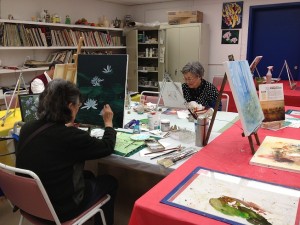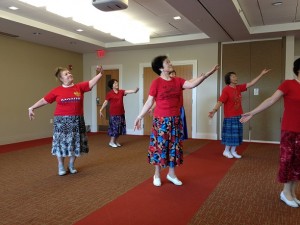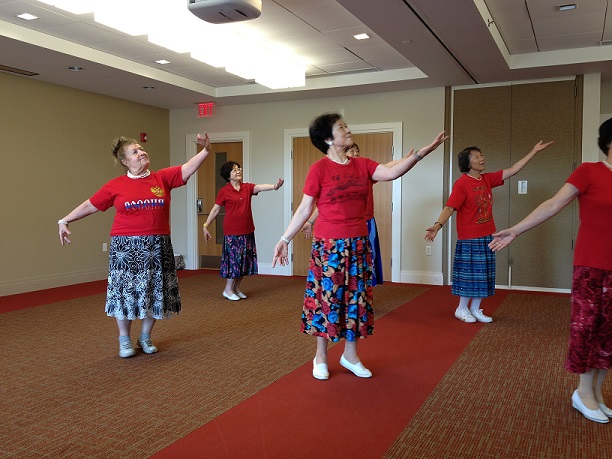Of the 1,450 low-income older adults living in Jewish Community Housing for the Elderly’s (JCHE) Brighton, Newton and Framingham communities, a large percentage is first-generation immigrants. On the Brighton campus, which is JCHE’s largest community, 900 residents come from 19 countries and speak 31 languages.
 Most were born in the former Soviet Union or in China, so programming is often offered in four languages: Cantonese, Mandarin, Russian and English.
Most were born in the former Soviet Union or in China, so programming is often offered in four languages: Cantonese, Mandarin, Russian and English.
“We have translators who make it possible for us to communicate everything – from newsletters to maintenance updates to building signage – in all of these different languages,” said Roberta Goldschneider, director of foundation relations for JCHE.
For Brighton resident Dora Gendel, who is from Russia, the cultural mix in her building is an asset. The efforts to bring people together through activities “help our community greatly,” said Gendel. While speaking the same language would be optimal, Gendel has found that it is not crucial. “I live next door to a woman from China. She doesn’t speak Russian or English and I don’t know Chinese,” explained Gendel. “But we are always happy to see each other. We like being neighbors.”
The library on the Brighton campus, which is managed by residents, is well stocked with books and periodicals in English, Chinese and Russian. The many art and music programs offered on a daily basis also have a multicultural focus.
“These programs overcome language barriers,” said Goldschneider. “When residents come together to paint a mural, explore drumming or knit beautiful baby blankets for families in need, a common vocabulary is not required. People get involved in the activity and begin to connect with others who are also participating. These collaborative projects are a source of much pride and foster a sense of good will towards one another.”
With such a large immigrant population, JCHE also offers English as a Second Language (ESL) and classes to assist those who are applying for U.S. citizenship. “Each year around July 4th, we have a unique Independence Day celebration. The community comes together to recognize all of the residents who have become new citizens throughout the year,” said Susan Goodman, JCHE’s communications director. “The country of origin doesn’t matter – there is great joy to honor the new Americans.”

A Chinese Dance group at Jewish Community Housing for the Elderly
Of course, as residents become U.S. citizens, they fully embrace the responsibility of participating in elections. JCHE hosts candidate forums and like all activities, the remarks are translated into Mandarin, Cantonese and Russian. “Many of our residents grew up in countries under oppressive regimes so they consider it a real honor to engage in the democratic process,” explained Goodman.
“One of my favorite events is the multicultural Passover Seder that we host each spring,” continued Goodman. “We’ve created a special Hagaddah, which is the traditional Passover prayer book, which is written in English, Hebrew, Russian and Chinese so that residents of all backgrounds can participate. Before moving to JCHE, many experienced a personal Exodus from places where they felt unwelcomed or were unable to live freely. At JCHE, a celebration of liberation is a very unifying event.”
For Gendel, making connections is easy. “All it takes is a smile to bring people together,” she said. “We may speak a different language, but we have so much in common!”
This story was published originally in the Tufts Health Plan Foundation’s November 2013 newsletter.

